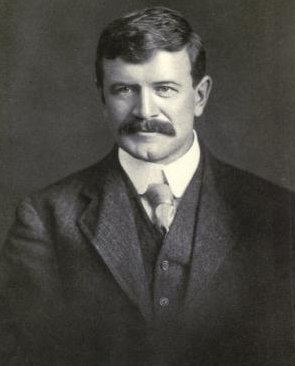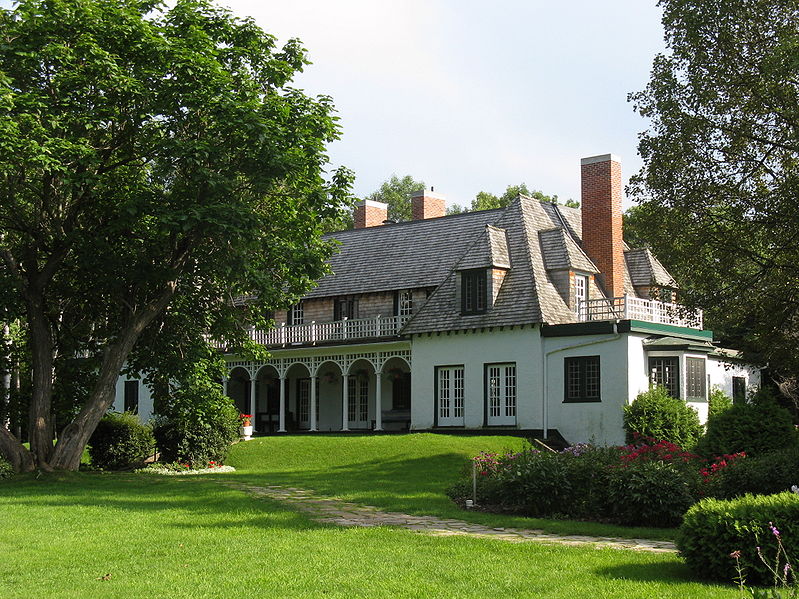<Back to Index>
- Economist Stephen Butler Leacock, 1869
- Novelist Theodor Fontane, 1819
- Emperor of the Roman Empire Titus Flavius Vespasianus, 39
PAGE SPONSOR


Stephen Butler Leacock, FRSC (30 December 1869 – 28 March 1944) was an English born Canadian economist, writer and humorist.
Leacock was born in Swanmore, near Bishop's Waltham, Hampshire, England, and at the age of six moved to Canada with his family, which settled on a farm in Egypt, Ontario, near the village of Sutton and the shores of Lake Simcoe. While the family had been well off in England (the Leacocks had made a fortune in Madeira and lived on an estate called Oak Hill on the Isle of Wight), Leacock's father, Peter, had been banished from the manor for marrying Agnes Butler without his parents' permission. The farm in the Georgina township of York County was not a success and the family (Leacock was the third of eleven children) was kept afloat by money sent by Leacock's grandfather. Peter Leacock became an alcoholic.
Stephen Leacock, always of obvious intelligence, was sent by his grandfather to the elite private school of Upper Canada College in Toronto, also attended by his older brothers, where he was top of the class and was chosen as head boy. In 1887, defending his mother and siblings against his father's alcoholic abuse, Leacock ordered him from the family home and he was never seen again. Walter Peter Leacock went to live in Argentina where he was a merchant and lived with a woman named Annie Leacock. That same year, seventeen year old Leacock started at University College at the University of Toronto, where he was admitted to the Zeta Psi fraternity, but found he could not resume the following year because of financial difficulties.
He left university to go to work teaching — an occupation he disliked immensely — at Strathroy, Uxbridge and finally in Toronto. As a teacher at Upper Canada College, his alma mater,
he was able simultaneously to attend classes at the University of
Toronto and, in 1891, earn his degree through part time studies. It was
during this period that his first writing was published in The Varsity, a campus newspaper. Disillusioned with teaching, in 1899 he began graduate studies at the University of Chicago, where he received a doctorate in political science and political economy. He moved from Chicago, Illinois, to Montreal, Quebec, where he became a lecturer and long time acting head of the political economy department at McGill University. He was closely associated with Sir Arthur Currie, former commander of the Canadian Corps in the Great War and
principal of McGill from 1919 until his death in 1933. In fact, Currie
had been a student observing Leacock's practice teaching in Strathroy
in 1888. In 1936, Leacock was forcibly retired by the McGill Board of
Governors — an unlikely prospect had Currie lived. Leacock was both a social conservative and a partisan Conservative.
He opposed women's rights (including the right to vote), and disliked
non - Anglo - Saxon immigration and supported the introduction of
social
welfare legislation. He was a staunch champion of the British Empire and went on lecture tours to further the cause. Although
he was considered as a candidate for Dominion elections by his party,
it declined to invite the author, lecturer, and maverick to stand for
election. Nevertheless, he would stump for local candidates at his
summer home. Early
in his career, Leacock turned to fiction, humour, and short reports to
supplement (and ultimately exceed) his regular income. His stories,
first published in magazines in Canada and the United States and
later in novel form, became extremely popular around the world. It was
said in 1911 that more people had heard of Stephen Leacock than had
heard of Canada. Also, between the years 1915 and 1925, Leacock was the
most popular humorist in the English speaking world. A humorist particularly admired by Leacock was Robert Benchley from
New York. Leacock opened correspondence with Benchley, encouraging him
in his work and importuning him to compile his work into a book.
Benchley did so in 1922, and acknowledged the nagging from north of the
border. Near the end of his life, the American comedian Jack Benny recounted how he had been introduced to Leacock's writing by Groucho Marx when they were both young vaudeville comedians.
Benny acknowledged Leacock's influence and, fifty years after first
reading him, still considered Leacock one of his favorite comic
writers. He was puzzled as to why Leacock's work was no longer well
known in the United States. During the summer months, Leacock lived at Old Brewery Bay, his summer estate in Orillia, across Lake Simcoe from where he was raised and also bordering Lake Couchiching. A working farm, Old Brewery Bay is now a museum and National Historic Site of Canada. Gossip provided by the local barber, Jefferson Short, provided Leacock with the material which would become Sunshine Sketches of a Little Town (1912), set in the thinly disguised Mariposa. Although
he wrote learned articles and books related to his field of study, his
political theory is now all but forgotten. Leacock was awarded the Royal Society of Canada's Lorne Pierce Medal in 1937, nominally for his academic work. In 1900 Leacock married Beatrix ("Trix") Hamilton, niece of Sir Henry Pellatt (who had built Casa Loma,
the largest castle in North America). In 1915 — after 15 years of
marriage — the couple had their only child, Stephen Lushington
Leacock. While Leacock doted on the boy, it became apparent early on
that "Stevie" suffered from a lack of growth hormone. Growing to be
only four feet tall, he had a love - hate relationship with Leacock, who
tended to treat him like a child. Predeceased
by Trix (who had died of breast cancer in 1925), Leacock was survived
by Stevie, who died in his fifties. In accordance with his wishes,
after his death from throat cancer, Leacock was buried in St George the Martyr Churchyard, Sutton, Ontario. Shortly after his death, Barbara Nimmo, his niece, literary executor and benefactor, published two major posthumous works: Last Leaves (1945) and The Boy I Left Behind Me (1946).
His physical legacy was less treasured, and his abandoned summer
cottage became derelict. It was rescued from oblivion when it was
declared a National Historic Site of Canada in 1958 and ever since has operated as a museum called the Stephen Leacock Memorial Home. In 1947, the Stephen Leacock Award was created to recognize the best in Canadian literary humour. In 1969, the centennial of his birth, Canada Post issued
a six cent stamp with his image on it. The following year, the Stephen
Leacock Centennial Committee had a plaque erected at his English
birthplace and a mountain in the Yukon was named after him. A number of buildings in Canada are named after Leacock, including the Stephen Leacock Building at McGill University, a theatre in Keswick, Ontario, and schools in Toronto and Ottawa.
Two Leacock short stories have been adapted as National Film Board of Canada animated shorts by Gerald Potterton: My Financial Career and The Awful Fate of Melpomenus Jones.